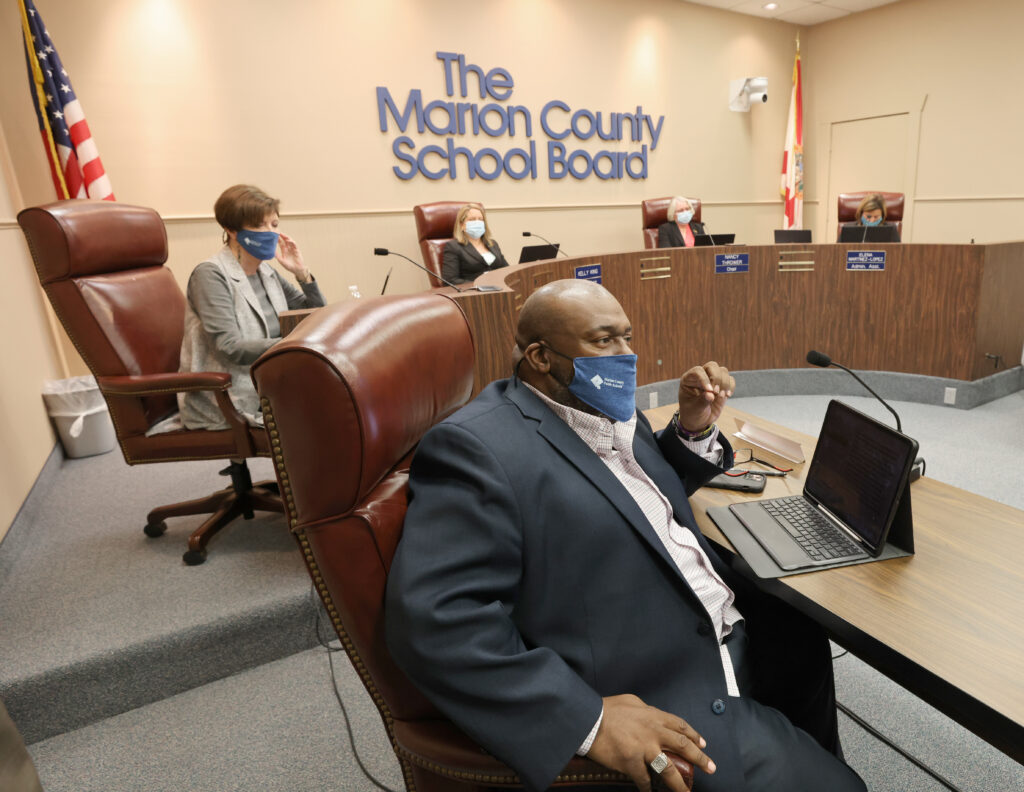Questions surround school board members’ legal residences

Eric Cummings speaks during a meeting of the Marion County Public School Board in Ocala, Fla. on Tuesday, March 23, 2021. [Bruce Ackerman/Ocala Gazette] 2021.
Two Marion County School Board members face questions about their eligibility to continue serving on the board based on where they legally reside.

Eric Cummings speaks during a meeting of the Marion County Public School Board in Ocala on March 23. Beth McCall is seen to his immediate left. The two board members face questions about their eligibility to continue serving on the board based on where they legally reside. [Bruce Ackerman/Ocala Gazette]
School board members must reside in the district residence area they are elected to and “shall maintain said residency throughout her or his term of office,” according to Florida Statute 1001.34.
When elected, both candidates signed residency affidavits that affirmed the address on their voter registration was their legal residence and swore they would maintain continuous residency in the district they represent throughout their term in office.
McCall’s last affidavit was signed on May 26, 2020, after she filed to run for a second term on the school board. She ran unopposed.
McCall, posted to social media on April 30 that she and her husband had moved to a new home that was not in District 2, but instead in District 1.
McCall said their decision to move was not based on being a school board member but “because of my husband’s health. We needed to downsize and move into town where we had family support.”
District 2 covers the Belleview and Lake Weir area of the county.
Cummings, who was first elected to the school board in 2018, used the address on his rental home in Dunnellon to qualify for District 3, which covers the northwest part of the county.
Cummings said he started renting the home in Dunnellon sometime in 2017 as a “place of solitude where he could recharge to do his work as pastor.” It also allowed him to stay close to the Dunnellon community where he had served as pastor of Union Mission Baptist Church. He served at the church from 2006 through 2016.
Cummings family also owns a larger home in Ocala that they built in 2005. He would not provide the address to the Ocala home, citing an exemption from publicly disclosing his address due to his previous work as a corrections officer. He said his wife does claim homestead exemption on the home.
In 2016, Cummings became pastor at New Zion Missionary Baptist in Ocala but said he and his family primarily reside at the Dunnellon rental house “5 to 6 days a week.” Cummings has a child enrolled at Vanguard High School.
In a 1974 case, Askew, Governor of the State of Florida v. Barbara B. Thomas, a similar issue was raised before the Florida Supreme Court. The court considered whether a school board member could retain her office after moving from the residence area from which she was elected.
In that decision, the Supreme Court held that “actual residence in area to be represented by school board member is required; thus, member could not continue to hold that office after moving.”
The school board member, Thomas, fought the governor’s removal on the basis that the residence requirement was “unreasonable.”
The Supreme Court disagreed. “There is understandable logic and reason for the residency requirement in this position; firsthand knowledge of conditions within a particular school board area are important to the service of the elected member. Perhaps it was felt in drafting the statute that the elected official would not be as responsive or as informed or as sensitive to the needs of that area if she did not live there with the people and their problems with which she was elected to deal. Certainly, this is not an unreasonable prerogative of the electorate, nor an unreasonable requirement of the office.”
In that case, the Florida Supreme Court sided with the governor and declared the school board office “vacant.”
McCall said she does not plan to run for a third term but does intend to finish her current term, “unless the governor says I have to vacate the seat because of moving.”
McCall’s term runs through 2024.
Cummings likens his living situation to others “who have two houses, one in town and a lake house,” agreeing that he chose to primarily live in the one meant typically for leisure.
Marion County Supervisor of Elections, Wesley Wilcox, says he has “no authority” to investigate the residence of candidates and did not know if the school board had any authority to investigate.
Wilcox explained that concerns such as a candidate’s residence are usually addressed with the election commission, after filing a complaint. Wilcox also pointed to the governor’s statutory power to suspend elected officials based on certain circumstances, but that it was his understanding that ultimately the senate would have to be involved in deciding for removal of an elected official.
Calls to the governor’s office and the school board were not immediately returned on Wednesday.





